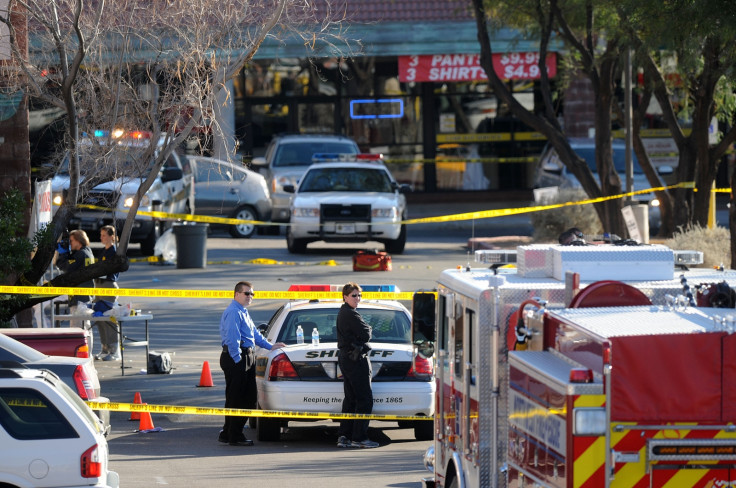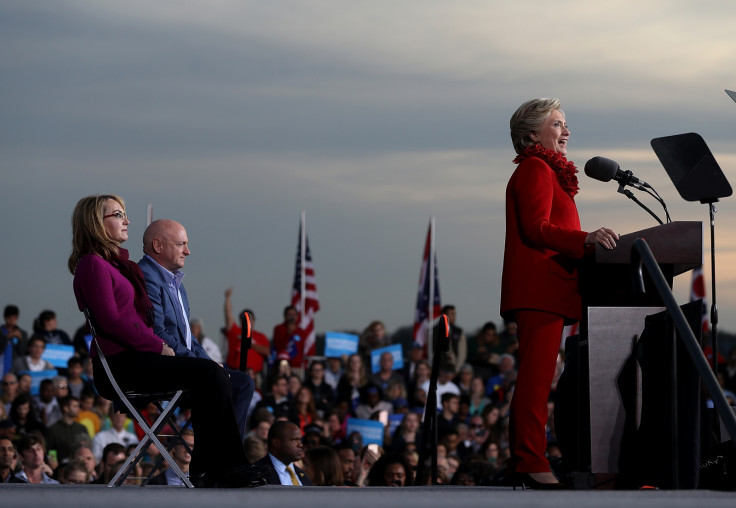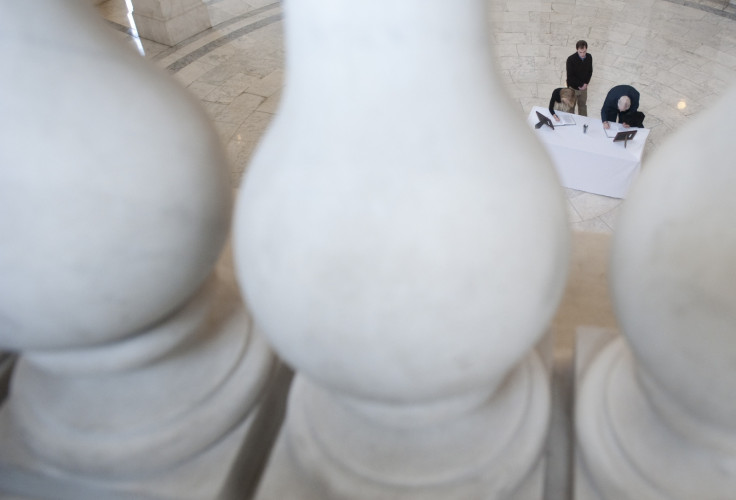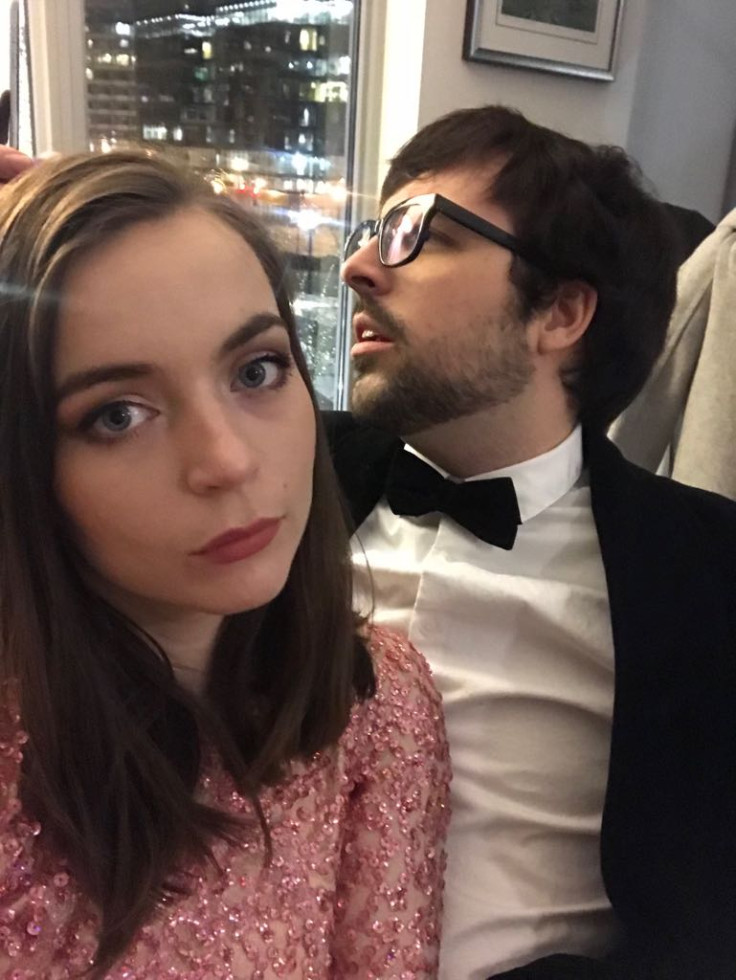What I've learned from my girlfriend, the mass shooting survivor
In 2011, Emma McMahon was waiting in line for Rep. Gabrille Giffords when a man pulled out a gun and started firing.

Emma told me on our first date that she and her family had been a part of the mass shooting targeting Representative Gabrielle Giffords in Tucson, Arizona in 2011. Emma was 17, she'd worked as a page for Giffords in Washington DC when she was younger. She'd come to meet her hero and ask for help with college applications.
As the family waited in line, Jared Lee Loughner shot Giffords in the head and fired at the people queuing. Emma's mother pinned her daughter against a wall to protect her and looked the shooter in the eye as he fired three bullets into her body.
I learned that detail after our first date because, like everyone else after a date, I went home and Googled her. On her Facebook page I found a link to an interview Emma McMahon and her mother Mary Reed had done with NPR's Storycorps. I listened and learned.
At first, I did not mention to Emma that I had found this interview. A main rule of trawling social media after a date is that you must not let the other person know that you have trawled social media after the date.
In those first weeks and months, Emma did not talk about the shooting much. We went on dates at bars around Washington and talked about work and politics. I am a journalist and she worked for a political consultancy, we are what people think of when you say a 'D.C. couple'. We both carry asthma inhalers.
It did not occur to me, naive to anything involving guns, that the shooting had had a lasting impact. She told me about it in a straightforward way that didn't say she was still dealing with it. When it really hit that, of course, an event of that magnitude would leave a mark, we were in the Landmark Cinema on E Street.
We watched Natalie Portman take on Jackie Kennedy Onassis in the days of the Kennedy White House. We watched her act out the aftermath of the Dallas shooting. Emma flinched as Lee Harvey Oswald's gunshots rang out in the theatre. Jackie held JFK's lifeless body as the motorcade sped down the highway, a camera from above showed the president's tattered skull, shattered to reveal the inner workings of his brain. After the film Emma told me that that was what it really looked like when a man had had a bullet travel through his skull.

As much as no-one wants an event so out of their control to take over their life, the events of 8 January 2011 had left an imprint on Emma's mind that would slowly come out as we got to know each other better. It informed and catalysed her want for activism but it also slowed her down when news cycles continually picked up moments from America's seemingly endless mass shootings.
Some of these things Emma told me, some of them I picked up as I spent time with her. It would be a few months into our relationship until I started to feel that she was talking openly. In my fumbling way, as an outsider to American culture and total outsider to guns, I thought it best not to push it - it wasn't my place.
This, though, was the way Emma worked. One survivor's way of going through the world with the sudden knowledge that the impossible was possible - even feeling more like probable at times. Her mother was different.
In a restaurant in Delaware, sitting across from me, Mary turned to Emma and loudly said "why doesn't he ask me questions?" Mary wanted to talk, frankly, to get anything I wanted to know out there. Needing a question, I asked about the family. They talked about each member of their unit and the days after, they talked together mostly and I sat and listened.
Our relationship opened more, thanks to the talkative mum. I felt emboldened to ask questions and she felt better talking. I learned about the people who tackled the gunman to the ground; the days after the shooting when the media came; when her mother was in hospital and the pain her mother still endures from the bullets that entered her body. I learned about the way people at high school didn't know how to act towards her. I learned that one day when it was becoming too much she'd driven to her best friend's house and sat on the living room floor with the family while they watched Despicable Me. Because of this she could no longer watch movies with Minions in them without being reminded of the time a man had taken out a gun and shot strangers outside a supermarket.

Sitting in my bed in the Capitol Hill she showed me the people who wrote long blog posts online detailing how the events of that day did not happen. The events that she had witnessed and been a part of had been a hoax. We laughed as we went through one of the websites. It had links to the Facebook pages of actors the person writing thought had been paid by the government to play Emma's family.
We clicked on the actress who had supposedly played Emma McMahon in this government orchestrated shooting and laughed at how little she looked like Emma. We laughed at the actress who they said had played her mother because it looked so little like her mother. We laughed because the idea that something so intrinsically real to her life was being called fake and that was ridiculous. We laughed because the only other reaction would have been terror that someone took so much time and wrote so much detail because they truly believed that Emma and her family were liars. They truly believed that six people, including a nine-year-old girl, were not shot dead in front of her that day.
I know now what to do when the next, inevitable American mass shooting takes place.
I would go on to learn about the community that had sprung up amongst the survivors. How the specialists who had arrived quickly to the scene had so helped those caught up in an event that no-one expected, no-one deserved and no-one could have fathomed moments before. I learned about Giffords' against-the-odds survival, her resignation a year later to focus on her recovery and the continuing gun-safety activism she and her husband promote. I learned about the communal sadness when Bill Badger, an Army veteran who at 74-year-old tackled the gunman to the ground, died a few years later after a battle with pneumonia.

I learned about this community first hand in December, at St Mark's Episcopal Church, at the National Vigil For All Victims of Gun Violence. We heard survivors tell their stories, we heard the families of victims tell their stories, we heard politicians call for action. We watched as the families of victims stood up with pictures of their taken loved ones and we watched as one mother wailed and wailed with the pain of loss. We sang songs. When the backing track for a children's choir skipped and suddenly stopped, leaving the children stood on stage in public limbo, we giggled at the awkward sense rippling through the crowd.
We took a longer route home that evening, walking past a local garage that has had a Ford Bronco II sat outside it for months. We talk about asking the garage if the car is for sale and driving it to campaign for people who we believe truly want and can deliver political change. I tell Emma to run for office. Her mother does too.
Our weekends are now about to change. Every week we try and watch the city's football team (American, that is) the Washington Redskins. Like any average D.C. liberal couple we talk about how bad the name is, then we cheer loudly when they score. They didn't make it to the play-offs this year so that part of our routine is gone. We don't go on dates like we did when we first started dating - we just sit at one of three or four bars in the area that we like and talk or watch TV shows at home.
I know now what to do when the next, inevitable American mass shooting takes place. The big ones that catch the media cycle, of course. Gun Violence Archive puts the number of mass shootings in America last year at 344, that's almost one every day.
When the big ones come, like in Las Vegas, I ask how she is and tell her to come over. I let her talk or not talk however much she needs. When her mother calls I know now to be direct, to hide any timidness. For the people you love, who have had to suffer the unexpected, who have had to know the fear of the unexpected, the best thing you can do, I think I've found, is to learn.
Slowly, more and more, you listen and you learn.






















